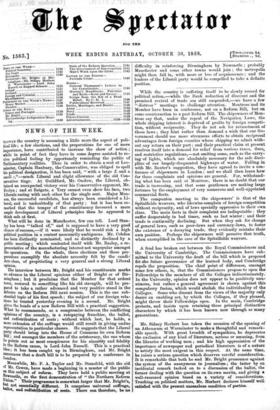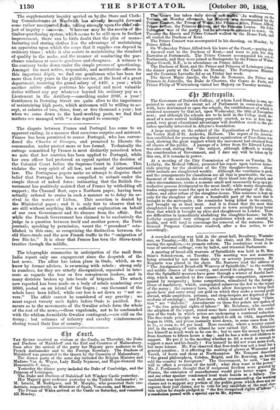NEWS OF THE WEEK.
SLOWLY the country is assuming a little more the aspect of poll-. heal life; a few elections, and the preparations for one of more importance, have contributed to increase the show of action ; while in point of fact they have in some degree assisted to re- vive political feeling by opportunely reminding the public of Parliamentary realities. Thus in order to obtain a seat at Leo- minster, Captain Hanbtuy, the Conservative, was obliged to spell his political designation' it has been said, "with a large L and a small e,"—much Liberal and slight allowance of the old Con- servative tinge. At Guildford, Mr. Onslow, the Liberal, ob- tained an unexpected victory over his Conservative opponent, Mr. Evelyn ; and at Reigate, a Tory cannot even stow his faesei two Liberals racing with each other for the single seat. Major Mon- son, the successful candidate, has always been considered a Li- beral, and is undoubtedly of that party ; but it has been re- marked that the temper of the constituency favoured a more ample development of Liberal principles than he appeared to think safe at first.
What will be done in Manchester, few can tell. Lord Stan- ley has been "talked of," and is supposed to have a very good chance of success,—if it were likely that he would risk a high political position in a contest necessarily ambiguous. Mr. Cobden has been distinctly nominated, and as distinctly declined by a public meeting ; which contented itself with Mr. Bazley, a re- presentative of the manufacturing interest not unpopular amongst the operatives. On the whole, these elections and those pre- parations exemplify the absolute necessity felt by the candi- date class, of propitiating a very general and a strong Liberal opinion.
The interview between Mr. Bright and his constituents marks no advance in the Liberal opinions either of Bright or of Bir- mingham ; but it proclaims that the Member for that ardent town, restored to sometliing like his old strength, will be pre- pared to tae a rather advanced and very positive stand in the debates on the Reform Bill next session. This is the one sub- stantial topic of his first speech ; the subject of our foreign rela- tions he treated yesterday evening in a second. Mr. Bright Elves the heads of a new Reform Bill with a practical suggestion. What he recommends, as a compromise between the conflicting Opinions of the country, is a ratepaying franchise' the ballot, and redistribution of seats ; without which last, he holds, a mere extension of the suffrage would still result in giving undue representation to particular classes. He suggests that the Liberal Party should bring into the House of Commons its own Reform Bill ; and amongst the members of the aristocracy, the one whom he points out as most conspicuous for his sincerity and fidelity tO the Reform cause, is Lord John Russell. This Is a practical Idea; it has been caught up in Birmingham, and Mr. Bright announces that a drat bill is to be prepared by a conference in London.
Meanwhile, Mr. P. A. Taylor and Mr. Stansfeld, with the aid of Mr. Cowen, have made a beginning in a muster of the public aa this subject of reform. They have held a public meeting at lieweastle, as the first demonstration of "the Northern Reform ,unien." Their programme is somewhat larger that Mr. Bright's, eat not essentially different. It comprises universal suffrage, ballot, and redistribution of seats. There can therefore, be no difficulty in reinforcing Birmingham by Newcastle ; probably Manchester and some other towns would join ; the metropolis might then fall in, with more or less of acquiescence ; and the leaders of the Liberal party would be compelled to take a definite position.
While the country is suffering itself to be slowly roused for political action,--while the Bank reduction of discount and the promised revival of trade are still suspended,—we have a few " distress " meetings to challenge attention. Montrose`and its Member have been in conference, not on a Reform Bill, but on some counteraction to a past Reform Bill. The shipowners of Mon- trose say that, under the repeal of the Navigation Laws, the whole shipping interest is deprived of profits by foreign competi- tion, without reciprocity. They do not ask for reenactment of those laws ; they hint rather than demand a wish that our Go- vernment should use more strenuous efforts to obtain reciprocal advantages from foreign counties whose shipping we admit with- out any return on their part ; and their practical claim at present resolves itself into a demand for relief from various taxes, dues, and restrictive regulations,—not °rafting some, such as the carry- ing of lights, which are absolutely necessary for the safe disci- pline of our largely-frequented highways of water. Falling in with Mr. Baxter's suggestion, they have agreed to invite a con- ference of shipowners in London ; and we shall then learn hew far these complaints and opinions are general. For, withstand- ing what has been said at Montrose, there is no doubt that our trade is increasing, and that some gentlemen are making large fortunes by the employment of very numerous and well-appointed commercial fleets.
The companion meeting to the shipowners' is that of the Spitalfields weavers, who likewise complain of foreign competition without reciprocity, and of laws specially oppressive to their own class. The main facts in their complaint are indisputable : they suffer desperately in bad times, such as last winter ; and their trade is continually declining. But when they ask for change of general laws, such as poor-laws and currency-laws, to foster the existence of a decaying trade, they evidently mistake their own position. Perhaps the shipowners will perceive that truth, when exemplified in the case of the Spitalfields weavers.
A feud has broken out between the Royal Commissioners and the University of Cambridge. The Commissioners have sub- mitted to the University the draft of the bill which is proposed for .the future governance of the learned body, and Cambridge- repels the proposition. The chief point of difference, amongst some few others, is, that the Commissioners propose to open the Fellowships to the members of all the Colleges indiscriminately; In the University, opinion does not appear to be pOsitively una- nimous, but rather a general agreement is shown against this compulsory fusion, which would abolish the individuality of the Colleges. Some who dissent from the views of the majority only desire an enabling act, by which the Colleges, if they pleased, might throw their Fellowships open. In the main, Cambridge protests, and insists upon retaining those principal distinetive characters by which it has been known now through so many generations.
Mr. Sidney Herbert has taken the occasion of the opening of an Athenteum at Warminster to make a thoughtful and remark- able speech. With great 'breadth of sympathies, he deprecates the exclusion of any kind of literature, serious or amusing, from the libraries of working men ; and his high appreoiation of the importance of newspaper and periodical literature is of a nature to satisfy the most exigent in this respect. At the same time, he raises a serious question which deserves careful consideration. It is remarkable that both he and Mr. Bright pronounce against the system of the anonymous in journalism; the latter by an incidental remark tacked on to a discussion of the ballot, the former dealing with the question on its own merits, and giving a well-reasoned opinion based on a variety of considerations. Touching on political matters Mr. Herbert declares himself well satisfied with the present anomalous oondition of parties. The supplementary inquiry carried on by the Store and Cloth- ing Commissioners at Woolwich has already brought forward some rather unexpected fads, telling strongly upon the thief sub- ject of inquiry e converse. Whatever may be the merits of the timber-purchasing system, which seems to be still open to further improvement, there can be little doubt that the plan of manu- facturing and storing clothes has the advantage of maintaining an apparatus upon which the corps that it supplies can depend in ordinary times ; while it also assists in maintaining the standard of quality in the make, and the manner of conducting the pur- chases conduces at once to goodness and cheapness. A witness to the contrary broke down under the simple process of questioning. Amongst the most active, responsible, and meritorious officers in This important &pit, we find one gentleman who has been for more than forty years in the public service, at the head of a great department, receiving the grand salary of 440/. a year ; while another active officer performs his special and most valuable duties without any pay whatever beyond his ordinary pay as a Lieutenant in the Artillery—something under 2001. a year ! Gentlemen in Downing Street are quite alive to the importance of maintaining high posts, which statesmen will be willing to ac- cept, at salaries of two, three, four, or five thousand a year ; but when we come down to the hard-working posts, we find that matters are managed with "a due regard to economy."
The dispute between France and Portugal has come to an apparent ending, in a manner that occasions surprise and mistrust. France has been permitted to coerce Portugal, who has surren- dered the Charles et Georges, and promised to liberate the commander, under protest more or less formal. Technically the outrage committed by France is most distinctly perceived when we note that her coercion has been applied to Portugal, while her own officer had preferred an appeal against the decision of the Colonial Court before the Supreme Court in Lisbon. This violates the very spirit of all law, not merely of international law. The Portuguese papers make no attempt to disguise their belief that Portugal has been compelled to submit under the simple threat of naked force; intimating that the British Go- vernment has positively assisted that of France by witholding all support; the Channel fleet, says a Northern paper, having been actually ordered to cruise in such a manner as to delay its ar- rival in the waters of Lisbon. This assertion is denied by the Ministerial paper ; and it is only fair to observe that we are still without anything like a sufficient explanation on behalf of our own Government and its absence from the affair. But while the French Government has claimed to be exclusively the judge in a question between itself and another power, the Paris journals, speaking by permission, vaunt the "precedent" esta- blished in this case, as recognizing the distinction between the old Slave-trade and the new French traffic in the "emigration of free Blacks." It is clear that France has torn the Slave-trade treaties through the middle.
The telegraphic summaries in anticipation of the mail from India report only one engagement since the despatch of the last news. The affair has taken place in Onde, which, as we know by former advices, is swarming with rebels ; strong only in numbers, for they are utterly disorganized, separated in inte- rests as regards the four or five conspicuous leaders, and in many districts broken up into bands of brigands. The attack now reported has been made on a body of rebels numbering over 3000, posted on an island of the Gogra ; one thousand of the rebels have been killed, while our loss is set down as "not se- vere." The affair cannot be considered of any gravity ; we must expect twenty such fights before Oude is pacified. Ru- mours as to the movements of the Gwalior rebels form the whole of the rest of the news,—these vagabonds, not to be confounded with the whilom formidable Gwalior contingent,—are still on the tramp ; but columns of infantry and cavalry reinforcements closing round their line of country.



























